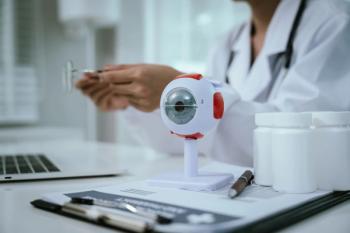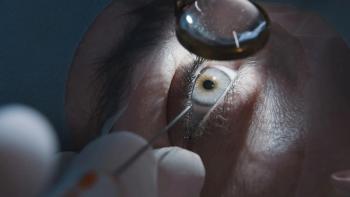
Develop a culture of mentorship
Optometry school is an awesome place. We have traveled the country over the past couple of years seeing all the great institutes of higher optometric education through our career coaching service, Optometric Insights. However, the real education hits home real quick as soon as our colleagues receive that beautiful diploma from their college dean. Suddenly the interest on the student loans start churning, and the desire to settle into the perfect practice either becomes a dream or a reality.
We have been honored to provide career coaching to hundreds of students, and we realize that the great ones start their optometric career on their first day of school, rather than on the second half of their graduation stage.
Having a positive outlook on the future of our profession is a 2-way street. These younger, smarter, better-looking, and extremely skilled colleagues of ours need help. They are looking for mentors. Being a mentor does not have to mean that you hire a new doctor into your practice. It also does not mean that you have to share advice with someone who practices next door to you.
Mentorship can mean many different things. Sharing clinical tips, talking about your mode of practice, discussing revenue streams, debating what the student has to offer vs. what an established practice might have to offer are all basis for mentorship.
We commonly hear from optometry students that they do not know where to find a mentor. When we ask what they have done to look, they say that they have done nothing. On the other hand, we encounter scores of practitioners who don’t speak to practitioners outside of their age group. Not because they avoid them, they just don’t share anything in common with the new grads.
Finding a mentor or becoming a mentor is rarely a planned activity. Great advice is just a fantastic tidbit that comes out of a natural conversation. If you are a senior OD (meaning you have been out for more than 10 years and definitely if you have been out for more than 25), we encourage you to make introductions whenever you encounter someone who is at an optometry event and looks lost or eager to learn. Students have never been to the events that you have attended your entire professional career. They do not know what is going on. So lend a hand and introduce yourself. Find out where they are from and where they are looking to practice. If they recently graduated, ask what they are doing and what they want to be doing in 5 years. Share your experience and how you came to where you are now.
Perhaps this relationship will result into an opportunity for this young OD to fill in at your practice someday when you go to an optometry meeting in Hawaii, or perhaps this person can help take a day of patient care off your back so that you can go play golf 1 day a week in the summer.
Advice for young ODs
To our young OD and student friends, please go to events. It is like dating-you’ll never meet someone unless you go to the dance. Start attending the summer meetings in the state in which you want to practice. If it is geographically possible, get involved with the local society and legislate at the state capital. If you don’t live close to where you want to practice, call up the state office in the area you want to practice and find out if there is a delegation of doctors attending the national meeting (like AOA) and ask if you might be able to join them for dinner or at any receptions that they have.
As 2015 grad Shane says in his message (see box), it just takes 1 introduction to get the ball rolling. The optometric community is a family, and we are all here for the same purpose. Joining forces with a mentor or a mentee can bring new life to your future and to your practice.
Next: In their words
In their words
We asked several students their thoughts on mentoring relationships and their plans after graduation.
Jeanette Strommen is a fourth-year optometry student at Pacific University. She is in her third clinical rotation at Specialty Eyecare Group with Dr. Kading in Seattle. Shane McDonald will graduate from Pacific University College of Optometry in 2015. Vivien Yip is a second-year student at the Illinois College of Optometry and serves as the trustee-elect for the American Optometric Student Association.
What are you looking for when you graduate?
Jeanette: When I graduate, I am looking to complete a residency in anterior segment disease/contact lenses. After residency, I plan to practice in my hometown, Minneapolis, in either a multi-doctor or private-practice setting. I aspire to be a primary-care doctor with part of my practice dedicated to treating contact lens and ocular disease patients.
Shane: Upon graduating in 2015, I hope to continue my education with a residency in cornea and contact lenses. Ideally, the skills I will refine with this residency will make me more beneficial to private practice, allowing me to see both primary-care patients, as well as a subset of referral-based specialty patients. Preferably, I would be working in an urban setting, where the patient volume will be higher, allowing me to see more patients specific to my specialty.
Vivien: I am looking to work as a part-time associate at a group practice with 3 to 4 optometrists and part time in a corporate setting. I hope to increase my efficiency by working corporate, and, by splitting my workweek at a private practice, I will be able to collaborate patient treatment plans with my colleagues. Being able to work with other ODs will ease my transition from student clinician to doctor and increase my confidence. I hope to work on my business plan for 1 to 2 years before opening my own practice. It will also be nice to start earning an income and have the freedom to travel.
How do you foresee an established optometrist helping you get there?
Jeanette: I think an established optometrist could help me get there by directing me toward opportunities that may suit my interests, whether that be through his or her own practice or in a colleague’s practice.
Shane: Optometry is a small world! It seems as though just about every doctor “knows someone who knows someone.” Having a good relationship with an established doctor multiplies your reach as a new grad searching for your dream position. For me, because I do not know an extensive network of doctors yet, my biggest asset will be knowing 1 or 2 established doctors who can alert me if another doctor they know is looking to hire. Furthermore, even if hiring is not the desire, I can utilize this network of established doctors to help foster my reputation as a new grad.
Vivien: I think starting up your own business takes a lot of intuition, and there’s no real textbook way to become successful at being an entrepreneur. Getting advice from mentors who have experience in what you are trying to accomplish is the most valuable resource because they can tell you what was successful or not with their strategy. An established OD can help in connecting you with other optometrists who may have had similar problems, industry representatives, and resources out there that you may not know are available. There is a lot in optometry that is recommended by word of mouth; therefore, being introduced to a new network of ODs to bounce ideas off of would be very helpful in developing my business ideas. I would look to them for emotional support because opening your own practice is not only a lot of work, often times it can cause stress on the relationships you have in your personal life. I think we are so conditioned in school to believe our careers have to take over our lives, because that is how I feel about studying sometimes. At the end of the day, though, it is important to work on having a balanced lifestyle, which is why I went into optometry in the first place.
What are you looking for from established optometrists?
Jeanette: I am looking for any opportunities they may have for me, as well as any advice they may have! An established practitioner obviously has more experience with running a business, billing and coding, managing staff, as well as treating tricky patients. I fully expect to not know everything about optometry the day I graduate, so any pearls of wisdom I can learn from an experienced clinician are valuable to me.
Shane: From a mentor doctor, the most important thing to me is the potential to learn how to operate a business. The last few years of my life, I have learned everything there is to know about eyes and how to perform an efficient examination. However, I have had little training in practice management and am not confident in running or purchasing a clinic at this time. Watching and learning from colleagues who own or have owned practices is wonderful. I can read all the textbooks I want about management, but in the end, the real-world experience of a mentor is the most effective education.
How can a mentoring relationship benefit the mentor doctor?
Jeanette: I think a mentorship relationship could benefit the established doctor in a couple of ways. First, we, as new grads, could add a new niche to a practice. With so many facets of optometry-pediatrics, binocular vision, contact lenses, ocular disease, and more-there’s bound to be an area of an existing practice that can grow. We, as new grads, could work to expand that part of the practice or add something new to it based on our experiences through school. Additionally, the established doctor may feel a sense pride or joy as he or she watches our new careers flourish (and possibly the practice too!) through support as a mentor. Throughout my years as a student, both prior to and during optometry school, I have had optometrists mentor me clinically, academically, as well as personally. I know that I would not be as successful as a student and clinician if it were not for those mentors and their support along the way. I cannot wait for the day when I have the opportunity to give back to my profession as a mentor to the next bright mind who wants to impact the world through work in optometry.
Shane: I believe that, like any profession, it can be extremely difficult for optometrists to stay updated and fluent with new technology and ideas. I have visited clinics that continue to practice optometry the same way they have for the past several years. Although new grads may not be efficient with real-world management, they are full of energy and ideas that have drastic potential to turn a stagnant practice back into an electric atmosphere.
Vivien: Working with a student can help an OD get fresh ideas about optometry, especially in terms of creative ways to market his or her practice. I think having a relationship with someone from a different generation is beneficial for both parties, and can help with interactions with patients. I think understanding the differences between generations can help you with communicating on a more personal level. For example, an older OD may not have a lot of experience with social media; therefore, connecting with a student can help that aspect of a practice. I think being in practice for many years can create a sense of comfort and complacency; therefore, having your choices and ideas about your practice challenged by a student that has no bias or previous experience can be beneficial for the doctor. It can spark unconventional changes that the practicing OD may never have thought of after working at the same office for 10 years or more. The beauty of networking and expanding social circles is to help each other improve in aspects unfamiliar to the other party.ODT
Newsletter
Want more insights like this? Subscribe to Optometry Times and get clinical pearls and practice tips delivered straight to your inbox.





